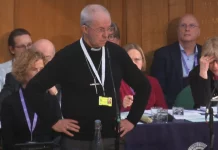My holiday reading has involved bouncing between two books. I was waiting eagerly to catch up with Dan Jones’ “Powers and Thrones” this summer, to get a fresh overview of European history. I wanted a reminder of how the Catholic Church evangelised Europe, since it looks increasingly like we are going to have to do it again; and the sooner the better. But, I also had Tom Bower’s expose: “Revenge. Meghan, Harry and the war between the Windsors”.
Tom Bower says that he specialises in writing the biographies of people who would rather not be written about. Before he turned his forensic scrutiny to Meghan and Harry, he had unveiled the darker corners of the lives of Robert Maxwell, Mohammed Al-Fayed and Conrad Black. He is a meticulous and methodical investigative journalist.
Having read a few dense chapters of Jones, and finding myself getting a bit bogged down in the collapse of the Roman Empire, I thought I might turn to Bower and Meghan Markle for a bit of light relief.
I was mistaken. It didn’t work. The raping and the pillaging of the Goths, Ostrogoths, Vandals and Huns, and the slow but terrifying collapse of Romano-Christian culture, made my hair stand on end much less that the mind-boggling collapse of culture that Meghan Markle’s redefinition of Truth brought about.
I fled back to the collapse of the Roman Empire as an antidote to the assault on the Windsors and Western culture. And then, after a chapter of Jones to calm the nerves, addict-like, I peaked at the next chapter of ‘Revenge…” unable to pull myself away for long.
Bower’s book documented the determined and merciless strategy that Team Markle engineered to keep one step ahead of the UK Windsors and wrong foot them.
They suggested the possibility of reconciliation while meticulously planning the next body blow. But also always invoking the leverage that woke culture added to their armoury of assumed moral and philosophical superiority.
This goal was achieved with the use of two particular weapons.
The first was mind-boggling relativism that would allow Meghan to repeatedly make claims that were intended to provide her with the moral high ground even while being objectively false. Bower documents a number of these and shows how they functioned to give her moral superiority, infused with the trump card of victim status. But it was the victim status that left me pondering.
It was not long ago that I remember reading Tom Holland in his startling latest book “Dominion” about the striking change that took place when a brutal power-fixated society that flourished by despising weakness and dishonour, gave way to one that values compassion and pity above power and control. It was the victimhood of Jesus on the cross, and the experience of forgiveness and transformation that proved stronger to the appetite of the human psyche than raw coercion and control.
Blake was to express this succinctly;
”For Mercy has a human heart
Pity, a human face:
and Love the human form divine,
and Peace a human dress.”
The incarnation replaced the brutality and seduction of power with an antidote to humanity’s deeper needs for forgiveness and compassion. But as Holland points out with a constant sense of surprise, this was not at all inevitable. It marked a profound transition from one kind of human society to another.
What is so striking and particular about the woke culture is that it is using the language of Christendom but with a different goal. In a subtle and subversive way it intends to restore the priority of the primacy of power. It uses victimhood as a way of both bolstering up relativism and stripping moral authority away from objective truth and Christian ethical values.
For example, when Megan makes a claim such as the one challenged by her half-sister recently, that she grew up an only child, her lawyers presented the defense in a libel trial, that Megan never meant this to be objectively true, and so falsifiable, but only experientially true. She felt it, so it became true. A whole generation of people under 50, steeped in woke sensitivity rushed to her defense; as they did too when Meghan claimed she was driven out of one of the most racially tolerant cultures in the Western world by “racism”.
Who knows how the family feud that eats away at the British monarchy’s foundations is going to work out. Will Meghan and Harry continue to wrong-foot Charles and William, or will they slip and stumble in their pursuit of money, influence and, as Bower alleges, revenge?
But it also poses an important theological challenge to the Church. A whole culture has been built on the sanctification of victimhood.
The sacrifice of Christ on the cross takes weakness and brokenness that flows from the vulnerability of Love and uses it as to provide freedom and forgiveness from guilt and moral condemnation.
But when “victimhood” is detached from Jesus and used as a means to a different ends, used instead to claim moral high ground but with the intention not of freeing and forgiving but of displacing and condemning something different and terrible is happening.
We should become more alert to the danger of the corruption of our own language and values and not taken in by appearances. Not all victimhood is virtuous.
We should do more than accept its currency at face value, asking instead what the concept is being used for?
Is it rooted in sacrifice and mercy, a process in which pain and suffering are offered transformatively producing forgiveness and compassion flowing from a voluntary acceptance of suffering to bring good to another? This is the Christian model.
Or is it being used as a means of blackmailing an opponent who caused pain and damage and using ethical leverage to exercise a moral power that is intended to produce revenge or reparation for some kind of physical, sexual or political abuse? A means in other words of exchanging one kind of power for another.
The differences between these two kinds of suffering depends firstly upon whether the victim is willing to forgive and secondly what the outcome is intended to be.
The competition for the allegiance of our culture is no longer the straightforward choice between power and compassion, Nietzsche and Jesus. Our opponents have become more subtle and have clothed their will for power and revenge in the trappings of love and compassion. We need to exercise discernment and intelligent discrimination to tell the difference.
If we are to maintain a culture in which compassion and love are the primary values, a foundation on which the whole history of Christendom has been built, we need to be wise and astute enough to call the bluff of coercive victimhood and resist the collapse back into a competition between the strongest and most brutal.










